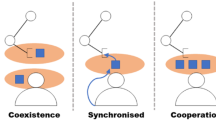Abstract
For effective Human-Robot Interaction (HRI), a robot should be human and human-environment aware. Perspective taking, effort analysis and affordance analysis are some of the core components in such human-centered reasoning. This paper is concerned with the need for benchmarking scenarios to assess the resultant intelligence, when such reasoning blocks function together. Despite the various competitions involving robots, there is a lack of approaches considering the human in their scenarios and in the reasoning processes, especially those targeting HRI. We present a game that is centered upon a human-robot competition, and motivate how our scenario, and the idea of a robot and a human competing, can serve as a benchmark test for both human-aware reasoning as well as inter-robot social intelligence. Based on subjective feedback from participants, we also provide some pointers and ingredients for evaluation matrices.
Access this chapter
Tax calculation will be finalised at checkout
Purchases are for personal use only
Similar content being viewed by others
References
Csibra, G., Volein, A.: Infants can infer the presence of hidden objects from referential gaze information. Br. J. Dev. Psychol. 26(1), 1–11 (2008)
Rochat, P.: Perceived reachability for self and for others by 3 to 5-year old children and adults. J. Exp. Child Psychol. 59, 317–333 (1995)
Breazeal, C., Berlin, M., Brooks, A.G., Gray, J., Thomaz, A.L.: Using perspective taking to learn from ambiguous demonstrations. Robot. Auton. Syst. 54, 385–393 (2006)
Trafton, J.G., Schultz, A.C., Bugajska, M., Mintz, F.: Perspective-taking with robots: experiments and models. In: IEEE International Workshop on Robots and Human Interactive Communication (RO-MAN), pp. 580–584 (2005)
Marin-Urias, L., Sisbot, E., Pandey, A., Tadakuma, R., Alami, R.: Towards shared attention through geometric reasoning for human robot interaction. In: Proceedings of 9th IEEE-RAS International Conference on Humanoid Robots (Humanoids), pp. 331–336 (2009)
Gibson, J.J.: The theory of affordances. In: The Ecological Approach to Visual Perception, pp. 127–143. Psychology Press (1986)
Clark, A.: An embodied cognitive science? Trends. Cogn. Sci. 3(9), 345–351 (1999)
Stoytchev, A.: Behavior-grounded representation of tool affordances. In: Proceedings of ICRA, pp. 3060–3065 (2005)
Ugur, E., Dogar, M.R., Cakmak, M., Sahin, E.: Curiosity-driven learning of traversability affordance on a mobile robot. In: IEEE International Conference on Development and Learning (ICDL), pp. 13–18, July 2007
Lopes, M., Melo, F.S., Montesano, L.: Affordance-based imitation learning in robots. In: Proceedings of IROS, pp. 1015–1021 (2007)
Robocup. http://www.robocup.org/
DARPA robotics challenge (DRC). http://www.theroboticschallenge.org/
European land-robot trial (elrob). http://www.elrob.org/
Humabot robot competition. http://www.irs.uji.es/humabot/
AAAI grand challenges. http://www.cs.utexas.edu/users/kuipers/AAAI-robot-challenge.html
Robocup-home. http://www.robocup.org/robocup-home/
Pandey, A.K., de Silva, L., Alami, R.: A novel concept of human-robot competition for evaluating a robot’s reasoning capabilities in HRI. In: International Conference on Human-Robot Interaction (HRI), pp. 491–492 (2016)
Pandey, A.K., Alami, R.: Affordance graph: a framework to encodeperspective taking and effort based affordances for day-to-day human-robotinteraction. In: Proceedings of IROS, pp. 2180–2187 (2013)
Gardner, D.L., Mark, L.S., Ward, J.A., Edkins, H.: How do task characteristics affect the transitions between seated and standing reaches? Ecol. Psychol. 13(4), 245–274 (2001)
Fleury, S., Herrb, M., Chatila, R.: Genom: a tool for the specification and the implementation of operating modules in a distributed robotarchitecture. In: Proceedings of IROS, pp. 842–848 (1997)
Simeon, T., Laumond, J.-P., Lamiraux, F.: Move3D: a generic platform for path planning. In: 4th International Symposium on Assembly and Task Planning, pp. 25–30 (2001)
Author information
Authors and Affiliations
Corresponding author
Editor information
Editors and Affiliations
Rights and permissions
Copyright information
© 2016 Springer International Publishing AG
About this paper
Cite this paper
Pandey, A.K., de Silva, L., Alami, R. (2016). A Human-Robot Competition: Towards Evaluating Robots’ Reasoning Abilities for HRI. In: Agah, A., Cabibihan, JJ., Howard, A., Salichs, M., He, H. (eds) Social Robotics. ICSR 2016. Lecture Notes in Computer Science(), vol 9979. Springer, Cham. https://doi.org/10.1007/978-3-319-47437-3_14
Download citation
DOI: https://doi.org/10.1007/978-3-319-47437-3_14
Published:
Publisher Name: Springer, Cham
Print ISBN: 978-3-319-47436-6
Online ISBN: 978-3-319-47437-3
eBook Packages: Computer ScienceComputer Science (R0)




